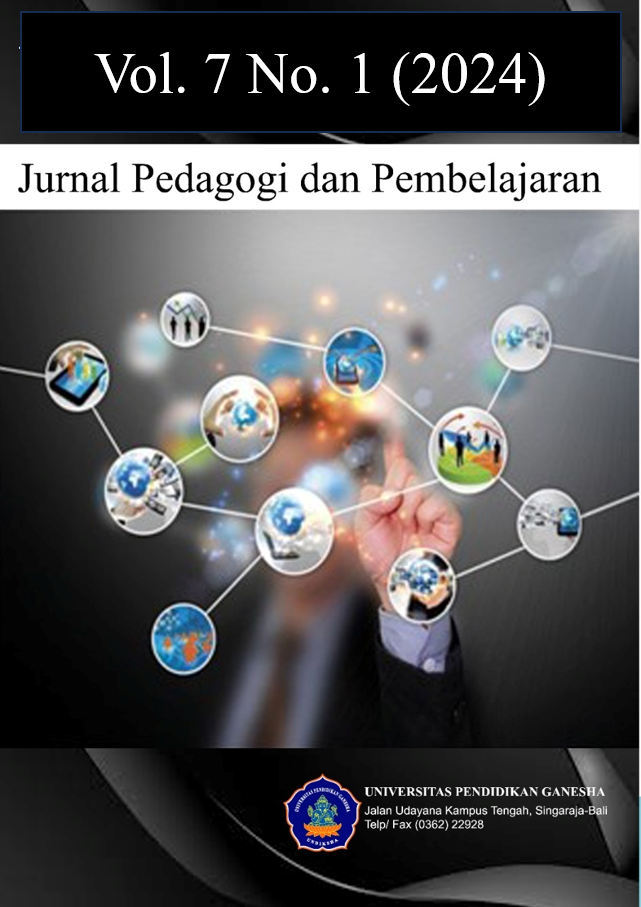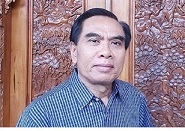Training Model Design Terrarium to Increase Teachers Special Education Competency
DOI:
https://doi.org/10.23887/jp2.v7i1.64472Keywords:
terrarium, ecosystem, training model, teacherAbstract
Special education teachers with non-science backgrounds were found to have 85% below standard and weak competency in explaining environmental phenomena related to ecosystem concepts and experiments. This condition requires conscious efforts to enhance quality through modeling and direct experimentation. This study aims to analyze the improvement of teacher competencies in creating terrariums by applying a training model based on "Gagne’s nine events of instruction". The method used is a pre-post design, data collection using test methods, and analyzed using the Wilcoxon test with SPSS 26. This research was conducted on 21 teachers from SLB School. The competency results of teacher knowledge based on the pretest and posttest show t count = 11.370 and t count = 3.092, t table (10-1) with alpha 0.05 two-tail = 1.833. Thus, the application of the training model based on Gagne's learning perspective improves teacher competencies in teaching terrarium materials. Furthermore, the training model can provide basic vocational knowledge, especially in terrarium design, improve teacher mastery, and motivation. The implications of this research can be used in schools with limited space to be presented in the classroom through mini-labs in the form of terrariums and for teachers teaching students with intellectual disabilities. These findings can serve as a reference for teachers in special education to conduct meaningful learning for students with intellectual disabilities in other learning materials.
References
Adams, B., Thomas, L., Moens, M., & Valcke, M. (2023). University teachers as versatile masters: Evaluating the effectiveness of a professional development programme on student-centred teaching competencies. Studies in Educational Evaluation, 77, 101260. https://doi.org/10.1016/j.stueduc.2023.101260. DOI: https://doi.org/10.1016/j.stueduc.2023.101260
Agbedahin, A. V. (2019). Sustainable development, Education for Sustainable Development, and the 2030 Agenda for Sustainable Development: Emergence, efficacy, eminence, and future. Sustainable Development, 27(4), 669–680. https://doi.org/10.1002/sd.1931. DOI: https://doi.org/10.1002/sd.1931
Apanasionok, M. M., Hastings, R. P., Grindle, C. F., Watkins, R. C., & Paris, A. (2019). Teaching science skills and knowledge to students with developmental disabilities: A systematic review. Journal of Research in Science Teaching, 56(7), 847–880. https://doi.org/10.1002/tea.21531. DOI: https://doi.org/10.1002/tea.21531
Ardwiyanti, D., Prasetyo, Z. K., & Wilujeng, I. (2021). STEM research trends in indonesia: A systematic literature review. Journal of Science Education Research Journal, 5(1), 38–45. https://doi.org/10.21831/jser.v5i1.41752.
Baran, E., Correia, A. P., & Thompson, A. (2011). Transforming online teaching practice: Critical analysis of the literature on the roles and competencies of online teachers. Distance Education, 32(3), 421–439. https://doi.org/10.1080/01587919.2011.610293. DOI: https://doi.org/10.1080/01587919.2011.610293
Bhurtel, A., & Bhattarai, P. C. (2023). Environmental Factors Affecting Training Transfer Among the Instructors. Vocations and Learning, 16(2), 293–312. https://doi.org/10.1007/s12186-023-09317-y. DOI: https://doi.org/10.1007/s12186-023-09317-y
Biora, S., Arafat, Y., & Mulyadi, M. (2021). The influence of teachers’ professional competency and working discipline on teachers’ performance at state elementary school. JPGI (Jurnal Penelitian Guru Indonesia), 6(2), 514. https://doi.org/10.29210/021082jpgi0005. DOI: https://doi.org/10.29210/021082jpgi0005
Blömeke, S., Jentsch, A., Ross, N., Kaiser, G., & König, J. (2022). Opening up the black box: Teacher competence, instructional quality, and students’ learning progress. Learning and Instruction, 79. https://doi.org/10.1016/j.learninstruc.2022.101600. DOI: https://doi.org/10.1016/j.learninstruc.2022.101600
Caballero, M., & Llorent, V. J. (2022). The effects of a teacher training program on neuroeducation in improving reading, mathematical, social, emotional and moral competencies of secondary school students. A two-year quasi-experimental study. Revista de Psicodidáctica (English Ed.), 27(2), 158–167. https://doi.org/10.1016/j.psicoe.2022.04.002. DOI: https://doi.org/10.1016/j.psicoe.2022.04.002
Campbell-Meier, J., & Goulding, A. (2021). Evaluating librarian continuing professional development: Merging Guskey’s framework and Vygotsky Space to explore transfer of learning. Library & Information Science Research, 43(4), 101119. https://doi.org/10.1016/j.lisr.2021.101119. DOI: https://doi.org/10.1016/j.lisr.2021.101119
Creswell, J. W., John W. Cresswell, & Creswell, J. W. (2018). Qualitative, Quantitative, and Mixed Methods Approaches. In SAGE: Vol. Fifth Edit.
Darling-Hammond, L., Flook, L., Cook-Harvey, C., Barron, B., & Osher, D. (2020). Implications for educational practice of the science of learning and development. Applied Developmental Science, 24(2), 97–140. https://doi.org/10.1080/10888691.2018.1537791. DOI: https://doi.org/10.1080/10888691.2018.1537791
de Vries, J. A., Dimosthenous, A., Schildkamp, K., & Visscher, A. J. (2022). The impact on student achievement of an assessment for learning teacher professional development program. Studies in Educational Evaluation, 74, 101184. https://doi.org/10.1016/j.stueduc.2022.101184. DOI: https://doi.org/10.1016/j.stueduc.2022.101184
Dominguez, S., & Svihla, V. (2023). A review of teacher implemented scaffolding in K-12. Social Sciences & Humanities Open, 8(1), 100613. https://doi.org/10.1016/j.ssaho.2023.100613. DOI: https://doi.org/10.1016/j.ssaho.2023.100613
Drigas, A., Mitsea, E., & Skianis, C. (2023). Meta-Learning: A Nine-Layer Model Based on Metacognition and Smart Technologies. Sustainability, 15(2), 1668. https://doi.org/10.3390/su15021668. DOI: https://doi.org/10.3390/su15021668
Eilam, B. (2012). System thinking and feeding relations: learning with a live ecosystem model. Instructional Science, 40(2), 213–239. https://doi.org/10.1007/s11251-011-9175-4. DOI: https://doi.org/10.1007/s11251-011-9175-4
Fortus, D., & Touitou, I. (2021). Changes to students’ motivation to learn science. Disciplinary and Interdisciplinary Science Education Research, 3(1), 1. https://doi.org/10.1186/s43031-020-00029-0. DOI: https://doi.org/10.1186/s43031-020-00029-0
García, E. G., Magaña, E. C., & Ariza, A. C. (2020). Quality education as a sustainable development goal in the context of 2030 agenda: Bibliometric approach. Sustainability (Switzerland), 12(15), 1–18. https://doi.org/10.3390/SU12155884. DOI: https://doi.org/10.3390/su12155884
Goldberg, P., Schwerter, J., Seidel, T., Müller, K., & Stürmer, K. (2021). How does learners’ behavior attract preservice teachers’ attention during teaching? Teaching and Teacher Education, 97, 103213. https://doi.org/10.1016/j.tate.2020.103213. DOI: https://doi.org/10.1016/j.tate.2020.103213
Hermanto, H., & Pamungkas, B. (2023). Teacher Strategies for Providing Access to Learning for Students with Special Needs in Elementary Schools. International Journal of Learning, Teaching and Educational Research, 22(4), 345–361. https://doi.org/10.26803/ijlter.22.4.20. DOI: https://doi.org/10.26803/ijlter.22.4.20
Jacob, U. S., Pillay, J., & Oyefeso, E. O. (2021). Attention Span of Children With Mild Intellectual Disability: Does Music Therapy and Pictorial Illustration Play Any Significant Role? Frontiers in Psychology, 12. https://doi.org/10.3389/fpsyg.2021.677703. DOI: https://doi.org/10.3389/fpsyg.2021.677703
Karlen, Y., Hirt, C. N., Jud, J., Rosenthal, A., & Eberli, T. D. (2023). Teachers as learners and agents of self-regulated learning: The importance of different teachers competence aspects for promoting metacognition. Teaching and Teacher Education, 125, 104055. https://doi.org/10.1016/j.tate.2023.104055. DOI: https://doi.org/10.1016/j.tate.2023.104055
Keefe, E. S. (2020). Learning to practice digitally: Advancing pre-service teachers’ preparation via virtual teaching and coaching. Journal of Technology and Teacher Education, 28(2), 223–232. https://doi.org/https://www.learntechlib.org/primary/p/216145/.
Khoeriah, N. D., Nur’aeni, N., & Astuti, E. Y. (2021). Pedagogic competencies of special education teachers in develop vocational skills for students with intellectual disabilities. JPPI (Jurnal Penelitian Pendidikan Indonesia), 7(2). https://doi.org/10.29210/020211260. DOI: https://doi.org/10.29210/020211260
Kim, H. S., & Oh, E. G. (2018). Scaffolding Argumentation in Asynchronous Online Discussion. International Journal of Online Pedagogy and Course Design, 8(2), 29–43. https://doi.org/10.4018/IJOPCD.2018040103. DOI: https://doi.org/10.4018/IJOPCD.2018040103
Kim, S., Raza, M., & Seidman, E. (2019). Improving 21st-century teaching skills: The key to effective 21st-century learners. Research in Comparative and International Education, 14(1), 99–117. https://doi.org/10.1177/1745499919829214. DOI: https://doi.org/10.1177/1745499919829214
Knight, V. F., Wood, L., McKissick, B. R., & Kuntz, E. M. (2020). Teaching Science Content and Practices to Students With Intellectual Disability and Autism. Remedial and Special Education, 41(6), 327–340. https://doi.org/10.1177/0741932519843998. DOI: https://doi.org/10.1177/0741932519843998
Kocaöz, O. E., & Yalçın, G. (2022). The effectiveness of Gagne s model in concept teaching for a student with intellectual disability. Journal of Pedagogical Research. https://doi.org/10.33902/JPR.202216895 DOI: https://doi.org/10.33902/JPR.202216895
MacLeod, M., & van der Veen, J. T. (2020). Scaffolding interdisciplinary project-based learning: a case study. European Journal of Engineering Education, 45(3), 363–377. https://doi.org/10.1080/03043797.2019.1646210. DOI: https://doi.org/10.1080/03043797.2019.1646210
McNeill, L., & Fitch, D. (2023). Microlearning through the Lens of Gagne’s Nine Events of Instruction: A Qualitative Study. TechTrends, 67(3), 521–533. https://doi.org/10.1007/s11528-022-00805-x. DOI: https://doi.org/10.1007/s11528-022-00805-x
Muksin, M., Daryanto, D., & Monantun, R. (2023, February). Implementing Continuing Professional Development Programs: Perceptions of Civil Servant Vocational Teachers at State Vocational High Schools. Proceedings of the 5th International Conference on Vocational Education and Technology, IConVET 2022, 6 October 2022, Singaraja, Bali, Indonesia. https://doi.org/http://dx.doi.org/10.4108/eai.6-10-2022.2327355. DOI: https://doi.org/10.4108/eai.6-10-2022.2327355
Naezak, N. A., Savitri, E. N., & Fibriana, F. (2021). Simple Terrarium Teaching Aid for Guided Inquiry Learning Model: The Development of Learning Instruments to Students’ Concept Understanding in Global Warming and Environmental Awareness. Journal of Innovation in Educational and Cultural Research, 2(2), 51–59. https://doi.org/10.46843/jiecr.v2i2.37. DOI: https://doi.org/10.46843/jiecr.v2i2.37
Nordlund, L. M. (2016). Teaching ecology at university—Inspiration for change. Global Ecology and Conservation, 7, 174–182. https://doi.org/10.1016/j.gecco.2016.06.008. DOI: https://doi.org/10.1016/j.gecco.2016.06.008
Oudeweetering, K., & Voogt, J. (2018). Teachers’ conceptualization and enactment of twenty‐first century competences: exploring dimensions for new curricula. The Curriculum Journal, 29(1), 116–133. https://doi.org/10.1080/09585176.2017.1369136. DOI: https://doi.org/10.1080/09585176.2017.1369136
Peiris-John, R., Jain, N. R., Hogan, A., & Ameratunga, S. (2021). Educating health science students about disability: Teachers’ perspectives on curricular gaps. Disability and Health Journal, 14(1), 100985. https://doi.org/10.1016/j.dhjo.2020.100985. DOI: https://doi.org/10.1016/j.dhjo.2020.100985
Peng, M. Y.-P., Feng, Y., Zhao, X., & Chong, W. (2021). Use of Knowledge Transfer Theory to Improve Learning Outcomes of Cognitive and Non-cognitive Skills of University Students: Evidence From Taiwan. Frontiers in Psychology, 12. https://doi.org/10.3389/fpsyg.2021.583722. DOI: https://doi.org/10.3389/fpsyg.2021.583722
Puente, S. M. G., & Kroesen, G. M. W. (2020). Facilitating Retention and Transfer of Physics Concepts with Challenging Assignments in Design-Based Learning Projects. Open Journal of Social Sciences, 08(12), 366–387. https://doi.org/10.4236/jss.2020.812030. DOI: https://doi.org/10.4236/jss.2020.812030
Reinius, H., Kaukinen, I., Korhonen, T., Juuti, K., & Hakkarainen, K. (2022). Teachers as transformative agents in changing school culture. Teaching and Teacher Education, 120, 103888. https://doi.org/10.1016/j.tate.2022.103888. DOI: https://doi.org/10.1016/j.tate.2022.103888
Richardson, J. C., Caskurlu, S., Castellanos-Reyes, D., Duan, S., Duha, M. S. U., Fiock, H., & Long, Y. (2022). Instructors’ conceptualization and implementation of scaffolding in online higher education courses. Journal of Computing in Higher Education, 34(1), 242–279. https://doi.org/10.1007/s12528-021-09300-3. DOI: https://doi.org/10.1007/s12528-021-09300-3
Rubini, B., Ardianto, D., Pursitasari, I. D., & Permana, I. (2017). Professional development model for science teachers based on scientific literacy. IOP Conference Series: Materials Science and Engineering, 166, 012037. https://doi.org/10.1088/1757-899X/166/1/012037. DOI: https://doi.org/10.1088/1757-899X/166/1/012037
Rusu, A. S., Copaci, I. A., & Soos, A. (2015). The Impact of Service-Learning on Improving Students’ Teacher Training: Testing the Efficiency of a Tutoring Program in Increasing Future Teachers’ Civic Attitudes, Skills and Self-Efficacy. Procedia - Social and Behavioral Sciences, 203, 75–83. https://doi.org/10.1016/j.sbspro.2015.08.262. DOI: https://doi.org/10.1016/j.sbspro.2015.08.262
Safitri, A. O., Yunianti, V. D., & Rostika, D. (2022). Upaya Peningkatan Pendidikan Berkualitas di Indonesia: Analisis Pencapaian Sustainable Development Goals (SDGs). Jurnal Basicedu, 6(4), 7096–7106. https://doi.org/10.31004/BASICEDU.V6I4.3296. DOI: https://doi.org/10.31004/basicedu.v6i4.3296
Sládek, P., Miléř, T., & Benárová, R. (2011). How to increase students’ interest in science and technology. Procedia - Social and Behavioral Sciences, 12, 168–174. https://doi.org/10.1016/j.sbspro.2011.02.024. DOI: https://doi.org/10.1016/j.sbspro.2011.02.024
So, W. W. M., He, Q., Chen, Y., Li, W. C., Cheng, I. N. Y., & Lee, T. T. H. (2022). Engaging Students with Intellectual Disability in Science, Technology, Engineering, and Mathematics Learning. Science Education International, 33(1), 25–37. https://doi.org/10.33828/sei.v33.i1.3. DOI: https://doi.org/10.33828/sei.v33.i1.3
Wamsler, C., & Restoy, F. (2020). Emotional Intelligence and the Sustainable Development Goals: Supporting peaceful, just, and inclusive societies. Peace, Justice and Strong Institutions, 1–11. https://doi.org/10.1007/978-3-319-71066-2_123-1. DOI: https://doi.org/10.1007/978-3-319-71066-2_123-1
Wanchana, Y., Inprom, P., Rawang, W., & Ayudhya, A. J. N. (2020). Environmental Education Competency: Enhancing the Work of Teachers. Journal of Teacher Education for Sustainability, 22(2), 140–152. https://doi.org/10.2478/jtes-2020-0021. DOI: https://doi.org/10.2478/jtes-2020-0021
Widajati, W., & Mahmudah, S. (2022). Promt Scaffolding in Learning Life Skills for Self-Development of Intellectual Disabilities Students in Inclusive Primary School. JPI (Jurnal Pendidikan Indonesia), 11(1), 71–77. https://doi.org/10.23887/jpi-undiksha.v11i1.33962. DOI: https://doi.org/10.23887/jpi-undiksha.v11i1.33962
Yang, X., & Kaiser, G. (2022). The impact of mathematics teachers’ professional competence on instructional quality and students’ mathematics learning outcomes. Current Opinion in Behavioral Sciences, 48, 101225. https://doi.org/10.1016/j.cobeha.2022.101225. DOI: https://doi.org/10.1016/j.cobeha.2022.101225
Downloads
Published
How to Cite
Issue
Section
License
Copyright (c) 2024 asri wijiastuti Winarno

This work is licensed under a Creative Commons Attribution-ShareAlike 4.0 International License.
Authors who publish with Jurnal Pedagogi dan Pembelajaran agree to the following terms:- Authors retain copyright and grant the journal the right of first publication with the work simultaneously licensed under a Creative Commons Attribution License (CC BY-SA 4.0) that allows others to share the work with an acknowledgment of the work's authorship and initial publication in this journal
- Authors are able to enter into separate, additional contractual arrangements for the non-exclusive distribution of the journal's published version of the work (e.g., post it to an institutional repository or publish it in a book), with an acknowledgment of its initial publication in this journal.
- Authors are permitted and encouraged to post their work online (e.g., in institutional repositories or on their website) prior to and during the submission process, as it can lead to productive exchanges, as well as earlier and greater citation of published work. (See The Effect of Open Access)













